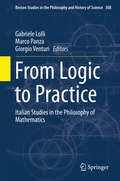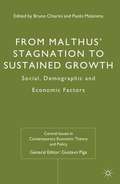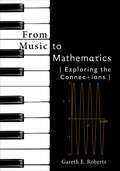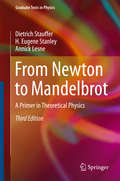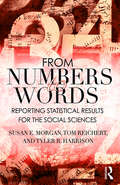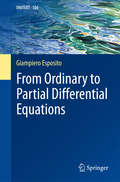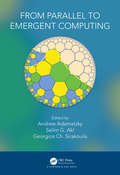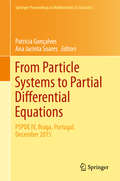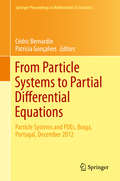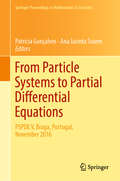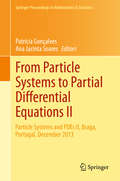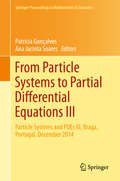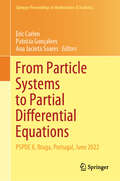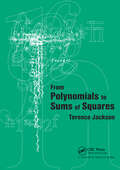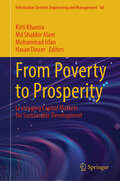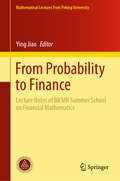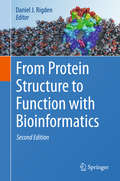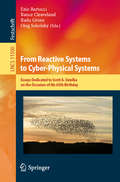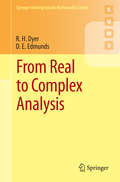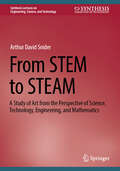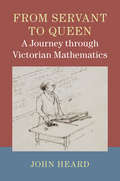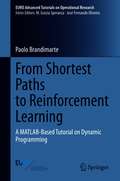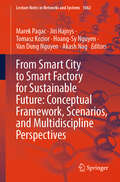- Table View
- List View
From Logic to Practice
by Marco Panza Gabriele Lolli Giorgio VenturiThis book brings together young researchers from a variety of fields within mathematics, philosophy and logic. It discusses questions that arise in their work, as well as themes and reactions that appear to be similar in different contexts. The book shows that a fairly intensive activity in the philosophy of mathematics is underway, due on the one hand to the disillusionment with respect to traditional answers, on the other to exciting new features of present day mathematics. The book explains how the problem of applicability once again plays a central role in the development of mathematics. It examines how new languages different from the logical ones (mostly figural), are recognized as valid and experimented with and how unifying concepts (structure, category, set) are in competition for those who look at this form of unification. It further shows that traditional philosophies, such as constructivism, while still lively, are no longer only philosophies, but guidelines for research. Finally, the book demonstrates that the search for and validation of new axioms is analyzed with a blend of mathematical historical, philosophical, psychological considerations.
From Malthus’ Stagnation to Sustained Growth
by Paolo Malanima Bruno ChiariniA detailed exploration of the influence and utility of Thomas Malthus' model of population growth and economic changes in Europe since the nineteenth century. This important contribution to current discussions on theories of economic growth includes discussion of issues ranging from mortality and fertility to natural resources and the poverty trap.
From Music to Mathematics: Exploring the Connections
by Gareth E. RobertsA guided tour of the mathematical principles inherent in music.Taking a "music first" approach, Gareth E. Roberts's From Music to Mathematics will inspire students to learn important, interesting, and at times advanced mathematics. Ranging from a discussion of the geometric sequences and series found in the rhythmic structure of music to the phase-shifting techniques of composer Steve Reich, the musical concepts and examples in the book motivate a deeper study of mathematics.Comprehensive and clearly written, From Music to Mathematics is designed to appeal to readers without specialized knowledge of mathematics or music. Students are taught the relevant concepts from music theory (notation, scales, intervals, the circle of fifths, tonality, etc.), with the pertinent mathematics developed alongside the related musical topic. The mathematics advances in level of difficulty from calculating with fractions, to manipulating trigonometric formulas, to constructing group multiplication tables and proving a number is irrational. Topics discussed in the book include• Rhythm • Introductory music theory • The science of sound • Tuning and temperament• Symmetry in music • The Bartók controversy • Change ringing • Twelve-tone music• Mathematical modern music • The Hemachandra–Fibonacci numbers and the golden ratio• Magic squares • Phase shiftingFeaturing numerous musical excerpts, including several from jazz and popular music, each topic is presented in a clear and in-depth fashion. Sample problems are included as part of the exposition, with carefully written solutions provided to assist the reader. The book also contains more than 200 exercises designed to help develop students' analytical skills and reinforce the material in the text. From the first chapter through the last, readers eager to learn more about the connections between mathematics and music will find a comprehensive textbook designed to satisfy their natural curiosity.
From Newton to Mandelbrot
by H. Eugene Stanley Dietrich Stauffer Annick LesneThis textbook takes the reader on a tour of the most important landmarks of theoretical physics: classical, quantum, and statistical mechanics, relativity, electrodynamics, as well as the most modern and exciting of all: elementary particles and the physics of fractals. The second edition has been supplemented with a new chapter devoted to concise though complete presentation of dynamical systems, bifurcations and chaos theory. The treatment is confined to the essentials of each area, presenting all the central concepts and equations at an accessible level. Chapters 1 to 4 contain the standard material of courses in theoretical physics and are supposed to accompany lectures at the university; thus they are rather condensed. They are supposed to fill one year of teaching. Chapters 5 and 6, in contrast, are written less condensed since this material may not be part of standard lectures and thus could be studied without the help of a university teacher. An appendix on elementary particles lies somewhere in between: It could be a summary of a much more detailed course, or studied without such a course. Illustrations and numerous problems round off this unusual textbook. It will ideally accompany the students all along their course in theoretical physics and prove indispensable in preparing and revising the exams. It is also suited as a reference for teachers or scientists from other disciplines who are interested in the topic.
From Numbers to Words: Reporting Statistical Results for the Social Sciences
by Tom Reichert Susan Morgan Tyler R. HarrisonThis invaluable resource guides readers through the process of creating scholarly, publishable prose from the results of quantitative experiments and investigations. It delves into the issues commonly encountered when reporting the results of statistical experiments and investigations, and provides instruction re the representation of these results in text and visual formats. This unique research companion serves as a must-have reference for advanced students doing quantitative research and working with statistics, with the goal of writing up and publishing their findings; it also serves as a useful refresher for experienced researchers.
From One Child to Two Children: Opportunities and Challenges for the One-child Generation Cohort in China
by Shibei NiThis book dissects the reproductive intentions and behaviours of the one-child generation cohort in China, situated in the wider context of changing family life patterns and gendered lenses. Demonstrating that the one-child family is still favoured by the one-child generation, this book uncovers the socioeconomic dimensions and mechanisms of family relations underlying young people’s decision-making processes. It also incorporates individual considerations and experiences of childbearing from over 50 interviews to contribute to the development of China's social policy. Whereas men’s childbearing beliefs were relatively unexplored in the literature, the author included male interviewees to better reflect gender differences in relation to childbearing, employment and family. Analysing the relationship between life routine and the desire (or lack thereof) to increase China's population, the author argues that the current childbearing policy fails to accommodate the needs and demands of young people, thus limiting the uptake of China’s new policy.
From Ordinary to Partial Differential Equations
by Giampiero EspositoThis book is addressed to mathematics and physics students who want to develop an interdisciplinary view of mathematics, from the age of Riemann, Poincar#65533; and Darboux to basic tools of modern mathematics. It enables them to acquire the sensibility necessary for the formulation and solution of difficult problems, with an emphasis on concepts, rigour and creativity. It consists of eight self-contained parts: ordinary differential equations; linear elliptic equations; calculus of variations; linear and non-linear hyperbolic equations; parabolic equations; Fuchsian functions and non-linear equations; the functional equations of number theory; pseudo-differential operators and pseudo-differential equations. The author leads readers through the original papers and introduces new concepts, with a selection of topics and examples that are of high pedagogical value.
From Parallel to Emergent Computing
by Andrew Adamatzky Selim Akl Georgios SirakoulisModern computing relies on future and emergent technologies which have been conceived via interaction between computer science, engineering, chemistry, physics and biology. This highly interdisciplinary book presents advances in the fields of parallel, distributed and emergent information processing and computation. The book represents major breakthroughs in parallel quantum protocols, elastic cloud servers, structural properties of interconnection networks, internet of things, morphogenetic collective systems, swarm intelligence and cellular automata, unconventionality in parallel computation, algorithmic information dynamics, localized DNA computation, graph-based cryptography, slime mold inspired nano-electronics and cytoskeleton computers. Features Truly interdisciplinary, spanning computer science, electronics, mathematics and biology Covers widely popular topics of future and emergent computing technologies, cloud computing, parallel computing, DNA computation, security and network analysis, cryptography, and theoretical computer science Provides unique chapters written by top experts in theoretical and applied computer science, information processing and engineering From Parallel to Emergent Computing provides a visionary statement on how computing will advance in the next 25 years and what new fields of science will be involved in computing engineering. This book is a valuable resource for computer scientists working today, and in years to come.
From Particle Systems to Partial Differential Equations
by Patrícia Gonçalves Ana Jacinta SoaresThis book focuses on mathematical problems concerning different applications in physics, engineering, chemistry and biology. It covers topics ranging from interacting particle systems to partial differential equations (PDEs), statistical mechanics and dynamical systems. The purpose of the second meeting on Particle Systems and PDEs was to bring together renowned researchers working actively in the respective fields, to discuss their topics of expertise and to present recent scientific results in both areas. Further, the meeting was intended to present the subject of interacting particle systems, its roots in and impacts on the field of physics and its relation with PDEs to a vast and varied public, including young researchers. The book also includes the notes from two mini-courses presented at the conference, allowing readers who are less familiar with these areas of mathematics to more easily approach them. The contributions will be of interest to mathematicians, theoretical physicists and other researchers interested in interacting particle systems, partial differential equations, statistical mechanics, stochastic processes, kinetic theory, dynamical systems and mathematical modeling aspects.
From Particle Systems to Partial Differential Equations
by Patricia Gonçalves Cédric BernardinThis book presents the proceedings of the international conference Particle Systems and Partial Differential Equations I, which took place at the Centre of Mathematics of the University of Minho, Braga, Portugal, from the 5th to the 7th of December, 2012. The purpose of the conference was to bring together world leaders to discuss their topics of expertise and to present some of their latest research developments in those fields. Among the participants were researchers in probability, partial differential equations and kinetics theory. The aim of the meeting was to present to a varied public the subject of interacting particle systems, its motivation from the viewpoint of physics and its relation with partial differential equations or kinetics theory and to stimulate discussions and possibly new collaborations among researchers with different backgrounds. The book contains lecture notes written by François Golse on the derivation of hydrodynamic equations (compressible and incompressible Euler and Navier-Stokes) from the Boltzmann equation, and several short papers written by some of the participants in the conference. Among the topics covered by the short papers are hydrodynamic limits; fluctuations; phase transitions; motions of shocks and anti shocks in exclusion processes; large number asymptotics for systems with self-consistent coupling; quasi-variational inequalities; unique continuation properties for PDEs and others. The book will benefit probabilists, analysts and mathematicians who are interested in statistical physics, stochastic processes, partial differential equations and kinetics theory, along with physicists.
From Particle Systems to Partial Differential Equations (Springer Proceedings in Mathematics & Statistics #209)
by Patrícia Gonçalves Ana Jacinta SoaresThis book presents the proceedings of the international conference Particle Systems and Partial Differential Equations V, which was held at the University of Minho, Braga, Portugal, from the 28th to 30th November 2016. It includes papers on mathematical problems motivated by various applications in physics, engineering, economics, chemistry, and biology. The purpose of the conference was to bring together prominent researchers working in the fields of particle systems and partial differential equations, providing a venue for them to present their latest findings and discuss their areas of expertise. Further, it was intended to introduce a vast and varied public, including young researchers, to the subject of interacting particle systems, its underlying motivation, and its relation to partial differential equations. The book appeals to probabilists, analysts and also to mathematicians in general whose work focuses on topics in mathematical physics, stochastic processes and differential equations, as well as to physicists working in the area of statistical mechanics and kinetic theory.
From Particle Systems to Partial Differential Equations II
by Patrícia Gonçalves Ana Jacinta SoaresThis book focuses on mathematical problems concerning different applications in physics, engineering, chemistry and biology. It covers topics ranging from interacting particle systems to partial differential equations (PDEs), statistical mechanics and dynamical systems. The purpose of the second meeting on Particle Systems and PDEs was to bring together renowned researchers working actively in the respective fields, to discuss their topics of expertise and to present recent scientific results in both areas. Further, the meeting was intended to present the subject of interacting particle systems, its roots in and impacts on the field of physics and its relation with PDEs to a vast and varied public, including young researchers. The book also includes the notes from two mini-courses presented at the conference, allowing readers who are less familiar with these areas of mathematics to more easily approach them. The contributions will be of interest to mathematicians, theoretical physicists and other researchers interested in interacting particle systems, partial differential equations, statistical mechanics, stochastic processes, kinetic theory, dynamical systems and mathematical modeling aspects.
From Particle Systems to Partial Differential Equations III
by Patrícia Gonçalves Ana Jacinta Jacinta SoaresThe main focus of this book is on different topics in probability theory, partial differential equations and kinetic theory, presenting some of the latest developments in these fields. It addresses mathematical problems concerning applications in physics, engineering, chemistry and biology that were presented at the Third International Conference on Particle Systems and Partial Differential Equations, held at the University of Minho, Braga, Portugal in December 2014. The purpose of the conference was to bring together prominent researchers working in the fields of particle systems and partial differential equations, providing a venue for them to present their latest findings and discuss their areas of expertise. Further, it was intended to introduce a vast and varied public, including young researchers, to the subject of interacting particle systems, its underlying motivation, and its relation to partial differential equations. This book will appeal to probabilists, analysts and those mathematicians whose work involves topics in mathematical physics, stochastic processes and differential equations in general, as well as those physicists whose work centers on statistical mechanics and kinetic theory.
From Particle Systems to Partial Differential Equations: International Conference, Particle Systems and PDEs VI, VII and VIII, 2017-2019 (Springer Proceedings in Mathematics & Statistics #352)
by Patrícia Gonçalves Cédric Bernardin Ana Jacinta Soares François Golse Valeria RicciThis book includes the joint proceedings of the International Conference on Particle Systems and PDEs VI, VII and VIII. Particle Systems and PDEs VI was held in Nice, France, in November/December 2017, Particle Systems and PDEs VII was held in Palermo, Italy, in November 2018, and Particle Systems and PDEs VIII was held in Lisbon, Portugal, in December 2019. Most of the papers are dealing with mathematical problems motivated by different applications in physics, engineering, economics, chemistry and biology. They illustrate methods and topics in the study of particle systems and PDEs and their relation. The book is recommended to probabilists, analysts and to those mathematicians in general, whose work focuses on topics in mathematical physics, stochastic processes and differential equations, as well as to those physicists who work in statistical mechanics and kinetic theory.
From Particle Systems to Partial Differential Equations: PSPDE X, Braga, Portugal, June 2022 (Springer Proceedings in Mathematics & Statistics #465)
by Patrícia Gonçalves Ana Jacinta Soares Eric CarlenThis book presents the proceedings of the international conference Particle Systems and Partial Differential Equations X, which was held at the University of Minho, Braga, Portugal, from 2022. It includes papers on mathematical problems motivated by various applications in physics, engineering, economics, chemistry, and biology.
From Polynomials to Sums of Squares
by T.H JacksonFrom Polynomials to Sums of Squares describes a journey through the foothills of algebra and number theory based around the central theme of factorization. The book begins by providing basic knowledge of rational polynomials, then gradually introduces other integral domains, and eventually arrives at sums of squares of integers. The text is complemented with illustrations that feature specific examples. Other than familiarity with complex numbers and some elementary number theory, very little mathematical prerequisites are needed. The accompanying disk enables readers to explore the subject further by removing the tedium of doing calculations by hand. Throughout the text there are practical activities involving the computer.
From Poverty to Prosperity: Leveraging Capital Markets for Sustainable Development (Information Systems Engineering and Management #64)
by Hasan Dincer Mohammad Irfan Kirti Khanna Md Shabbir AlamThis book unites experts from academia, industry, and policy. They look at using capital markets to enhance sustainability. They also aim to support inclusive growth around the globe. The author dedicates the book to exploring how capital flows can benefit communities. When capital market flows support social and environmental goals, they foster lasting prosperity. This book covers many topics. It includes green finance, social impact bonds, and ESG investing. It also adds sustainable practices to regular finance. It connects theory with practice, capital markets, and SDGs. It highlights new financial tools and rules that are changing global finance. The book covers various topics, such as infrastructure funding and supporting women-led businesses. It shows that sustainable finance is a must. It&’s not only about doing the right thing, but also vital for strong economies. This book targets scholars, students, finance experts, and policymakers. It offers clear steps to build supportive ecosystems. It encourages teamwork between the public and private sectors. It also helps measure the real-world effects of sustainable investments. This book serves as a key academic resource and a practical tool. It is for anyone dedicated to creating a fairer, sustainable world using finance.
From Probability to Finance: Lecture Notes of BICMR Summer School on Financial Mathematics (Mathematical Lectures from Peking University)
by Ying JiaoThis volume presents a collection of lecture notes of mini-courses taught at BICMR Summer School of Financial Mathematics, from May 29 to June 9, 2017. Each chapter is self-contained and corresponds to one mini-course which deals with a distinguished topic, such as branching processes, enlargement of filtrations, Hawkes processes, copula models and valuation adjustment analysis, whereas the global topics cover a wide range of advanced subjects in financial mathematics, from both theoretical and practical points of view. The authors include world-leading specialists in the domain and also young active researchers.This book will be helpful for students and those who work on probability and financial mathematics.
From Protein Structure to Function with Bioinformatics
by Daniel J. RigdenThis book is about protein structural bioinformatics and how it can help understand and predict protein function. It covers structure-based methods that can assign and explain protein function based on overall folds, characteristics of protein surfaces, occurrence of small 3D motifs, protein-protein interactions and on dynamic properties. Such methods help extract maximum value from new experimental structures, but can often be applied to protein models. The book also, therefore, provides comprehensive coverage of methods for predicting or inferring protein structure, covering all structural classes from globular proteins and their membrane-resident counterparts to amyloid structures and intrinsically disordered proteins. The book is split into two broad sections, the first covering methods to generate or infer protein structure, the second dealing with structure-based function annotation. Each chapter is written by world experts in the field. The first section covers methods ranging from traditional homology modelling and fold recognition to fragment-based ab initio methods, and includes a chapter, new for the second edition, on structure prediction using evolutionary covariance. Membrane proteins and intrinsically disordered proteins are each assigned chapters, while two new chapters deal with amyloid structures and means to predict modes of protein-protein interaction. The second section includes chapters covering functional diversity within protein folds and means to assign function based on surface properties and recurring motifs. Further chapters cover the key roles of protein dynamics in protein function and use of automated servers for function inference. The book concludes with two chapters covering case studies of structure prediction, based respectively on crystal structures and protein models, providing numerous examples of real-world usage of the methods mentioned previously. This book is targeted at postgraduate students and academic researchers. It is most obviously of interest to protein bioinformaticians and structural biologists, but should also serve as a guide to biologists more broadly by highlighting the insights that structural bioinformatics can provide into proteins of their interest.
From Reactive Systems to Cyber-Physical Systems: Essays Dedicated to Scott A. Smolka on the Occasion of His 65th Birthday (Lecture Notes in Computer Science #11500)
by Ezio Bartocci Oleg Sokolsky Rance Cleaveland Radu GrosuThis Festschrift is in honor of Scott A. Smolka, Professor in the Stony Brook University, USA, on the occasion of his 65th birthday. Scott A. Smolka made fundamental research contributions in a number of areas, including process algebra, model checking, probabilistic processes, runtime verification, and the modeling and analysis of cardiac cells, neural circuits and flocking behaviors. He is perhaps best known for the algorithm he and Paris Kanellakis invented for checking bi-simulation. The title of this volume From Reactive Systems to Cyber-Physical Systems reflects Scott's main research focus throughout his career. It contains the papers written by his closest friends and collaborators. The contributions cover a wide spectrum of the topics related to Scott's research scientific interests, including model repair for probabilistic systems, runtime verification, model checking, cardiac dynamics simulation and machine learning.
From Real to Complex Analysis
by R. H. Dyer D. E. EdmundsThe purpose of this book is to provide an integrated course in real and complex analysis for those who have already taken a preliminary course in real analysis. It particularly emphasises the interplay between analysis and topology. Beginning with the theory of the Riemann integral (and its improper extension) on the real line, the fundamentals of metric spaces are then developed, with special attention being paid to connectedness, simple connectedness and various forms of homotopy. The final chapter develops the theory of complex analysis, in which emphasis is placed on the argument, the winding number, and a general (homology) version of Cauchy's theorem which is proved using the approach due to Dixon. Special features are the inclusion of proofs of Montel's theorem, the Riemann mapping theorem and the Jordan curve theorem that arise naturally from the earlier development. Extensive exercises are included in each of the chapters, detailed solutions of the majority of which are given at the end. From Real to Complex Analysis is aimed at senior undergraduates and beginning graduate students in mathematics. It offers a sound grounding in analysis; in particular, it gives a solid base in complex analysis from which progress to more advanced topics may be made.
From STEM to STEAM: A Study of Art from the Perspective of Science, Technology, Engineering, and Mathematics (Synthesis Lectures on Engineering, Science, and Technology)
by Arthur David SniderThis book provides readers with an introductory overview of art from the perspective of science, technology, engineering, and mathematics. The author utilizes well-known and important works of art to demonstrate how STEM concepts apply to them. The book’s examples include a structural analysis of Michelangelo’s David. The author covers major breakthroughs in art history, such as the discovery of perspective. The book also discusses other important elements of art, such as color, from a scientific point of view. The author ensures that readers will understand the art terms used by comparing them with terms used in STEM fields of study.
From Servant to Queen: A Journey through Victorian Mathematics
by John HeardWith a few notable exceptions, pure mathematics in Britain at the beginning of the nineteenth century was mainly a recreation for amateurs. Drawing on primary sources, John Heard provides an engaging account of the process by which it rose to become an academic discipline of repute which by the First World War was led by G. H. Hardy, and supported by the internationally-respected London Mathematical Society. In chronicling that rise, this book describes key contributions and the social environment in which mathematicians operated, using contemporary commentary where appropriate. No mathematical knowledge is required, and readers with a wide range of interests and backgrounds will find much to enjoy here. The material is presented from an impartial point of view, and provides full references to help any researchers who want to dig deeper into the original sources. The result is a unique insight into the world of Victorian mathematics and science.
From Shortest Paths to Reinforcement Learning: A MATLAB-Based Tutorial on Dynamic Programming (EURO Advanced Tutorials on Operational Research)
by Paolo BrandimarteDynamic programming (DP) has a relevant history as a powerful and flexible optimization principle, but has a bad reputation as a computationally impractical tool. This book fills a gap between the statement of DP principles and their actual software implementation. Using MATLAB throughout, this tutorial gently gets the reader acquainted with DP and its potential applications, offering the possibility of actual experimentation and hands-on experience. The book assumes basic familiarity with probability and optimization, and is suitable to both practitioners and graduate students in engineering, applied mathematics, management, finance and economics.
From Smart City to Smart Factory for Sustainable Future: Conceptual Framework, Scenarios, and Multidiscipline Perspectives (Lecture Notes in Networks and Systems #1062)
by Marek Pagac Jiri Hajnys Tomasz Kozior Hoang-Sy Nguyen Van Dung Nguyen Akash NagThis volume includes the proceedings of the 2nd International Conference on "From Smart City to Smart Factory for a Sustainable Future" (SCFF24), held at VSB - Technical University of Ostrava from May 14 to 16, 2024. The conference was organized in collaboration with university and institute partners from Czech Republic, Poland, India, and Vietnam. SCFF24 covers a broad range of topics, with a particular focus on the application of technologies in Smart Cities and Smart Factories to achieve a Sustainable Future. The Conference aims to bring together participants from diverse fields to share their knowledge, innovative ideas, and solutions to current challenges that hinder progress toward a more modern and sustainable life that we all share. In light on this, it also serves as a platform for the mutual exchange of experiences and the formation of enduring international collaborations. This book offers a comprehensive and multi-perspective view, providing readers with insights into the latest technological possibilities from voices around the world, with the hope of raising awareness and fostering further advancements in these fields.
